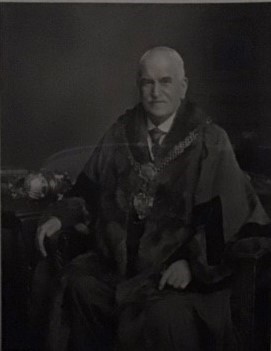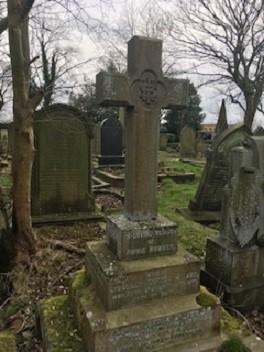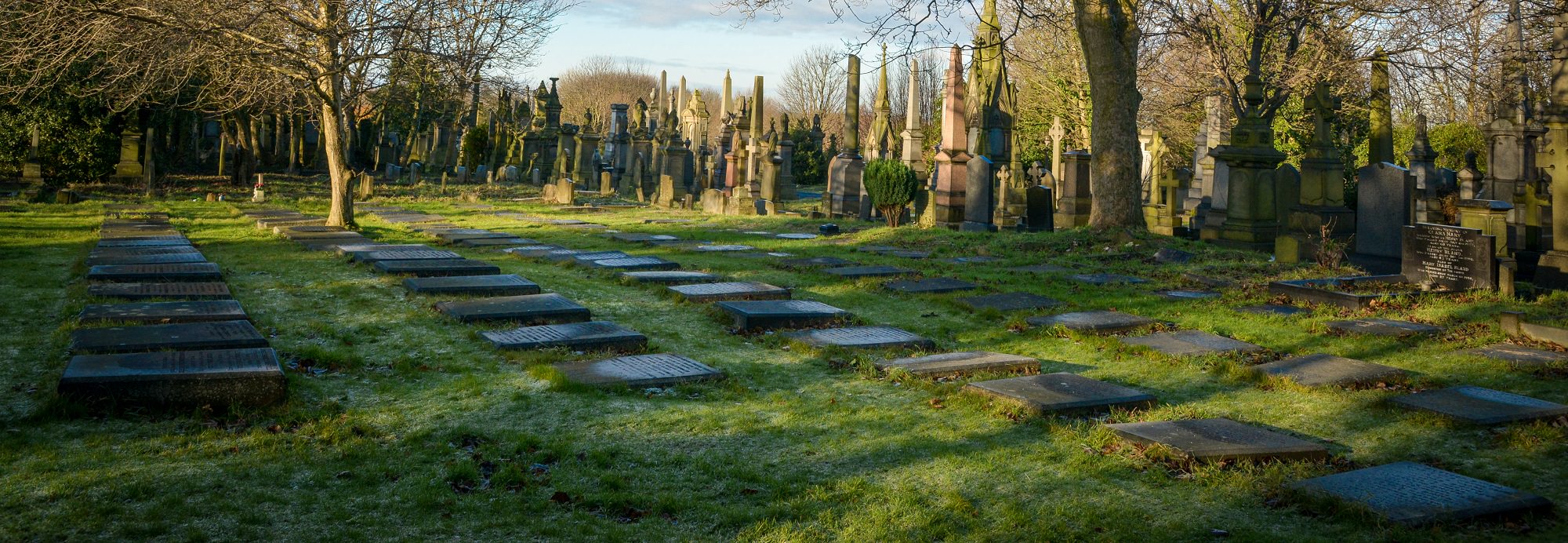George Walker
Alderman George Walker JP
(1859-1939)

George Walker, born 15 July 1859 in Bradford East End (now Eastbrook) (baptised on 24 August), was the fifth of six children of Joseph Walker, an Overlooker in a worsted spinning mill, born 1824 and baptised on 29 August at Bradford Cathedral and Mary Ann (née Inman) born 24 February 1825 at Keighley, Bradford; they married Jul-Sep 1846 in Keighley. His father Joseph was one of 7 children born to John Walker b. 1806 and also an Overlooker and Susannah also b. 1806; they were of Rushforth Square, Bradford. The Walker family are on record as living in the West Riding of Yorkshire for almost four hundred years. His mother Mary Ann was the daughter of John Inman and Anne Mitchel who married on the 10 May 1824 in Keighley. Joseph & Mary Ann and the family are recorded as living in Pratts Houses, Bradford in 1851.
George’s siblings were: John b. 27 April 1848 and baptised on 19 January 1849 at St Peter (Bradford Cathedral); Susan b. 20 March 1850 and baptised on 29 May at Bradford Cathedral; Sarah Elizabeth b. 11 January 1854 and baptised on 17June 1857 at Bradford Cathedral with Thomas Inman Walker b. 4 March 1856; and Mary Emma b. Oct-Dec 1861 in Bradford.
Following the untimely death of his father in 1863/64 at the age of forty, George started his working life at the age of eight as a half-timer in the mill and a year later a full-time wage-earner. After his long morning’s work, he would go home for his dinner, then to school for the afternoons. He had started at a Dame School in Annison Street when he was six, and later attended Gregory School in Otley Road when eight-and-a-half years old, then another in Ebenezer Street. Evening classes followed when he was old enough. It was a very hard-working childhood, which set the pattern for his whole life.
At the time of the 1861 Census the family were living at 185 Garnett Street, Bradford. Joseph was an Overlooker (worsted) age 37 with Mary his wife age 36, their son John working in a Stuff Warehouse age 13, two daughters Susan (also known as Susanna) age 11 a scholar and Sarah Elizabeth age 7, plus two further sons Thomas Inman age 5 and George age just 2.
The family was still at that address in 1871, though John had by then married. There was Mary, a widow at 46, with Sarah Elizabeth age 17, a Worsted Rover, Thomas Inman age 15, a Machine Jobber, George age 11 an Errand Boy and Mary Emma age 9 a Worsted Spinner. So, what happened to their son John? He married Elizabeth (Eliza) Whitaker Apr-Jun 1871 in Bradford. She was born on 22 April 1845 and baptised on 2 June 1845 at Leeds, St Peter to John Whitaker a Mechanic and Elizabeth of Regent Street, Leeds. John & Eliza were residing in Exeter Street, Bradford in 1871, he a Stuff Warehouseman age 22 with Eliza age 26 and their daughter Amy just 2 months old.
At the age of eighteen (although on their marriage certificate they were both recorded as being 19) George married Annie Howker Wadsworth of Laverack Hall, Haworth on 8 August 1877 in Bradford and they shared his mother’s house. Annie was born Apr-Jun 1858 in Bradford, the daughter of John Wadsworth and Elizabeth Howker who married in Apr-Jun 1844 in Bradford. George and Annie had two children who survived into old age, Arthur Cyril b. Apr-Jun 1885 and Hilda b. 6 October 1887, both in Bradford, but they lost one much-loved daughter in childhood, Florence Emily b. Oct-Dec 1878 in Bradford who died Jul-Sep 1882 when she was three years old.
George was always a devout churchman and total abstainer. In the summer of 1879, as Treasurer of the Bradford Band of Hope Union, he is recorded as handing over to the Secretary of the Bradford Infirmary the sum of £5/10/7d., the proceeds of a collection at the Band of Hope Gala in Peel Park. His association continued for many years.
In 1881 George and Annie were residing at 7 Airdale Square, Bradford East End, and he was registered as a Stuff Warehouseman, plus their daughter Florence Emily who died in 1882 age just 3 (as mentioned earlier).
George became a partner in the Provident Clothing Company, founded by Joshua Kelly Waddilove in 1880, but parted company amicably with the firm eventually on conscientious grounds, believing that the credit system (‘the never-never’) encouraged people buy things they could not afford, to live beyond their means. His photograph continued to hang in the firm’s offices and he remained highly regarded by the firm.
Sir Joshua Waddilove (knighted in 1919), born in Manningham, Bradford, working as an insurance agent, sees first-hand how some working-class families struggle to pay for essential items like furniture, clothes and shoes. He devises a voucher system that can be exchanged in local shops for clothing, food and coal. Families then repay the vouchers in small weekly instalments they can afford. Demand grows, so Sir Joshua opens an office and recruit’s agents to help collect the repayments. The Provident Clothing and Supply Company is born. By the time of Joshua’s death on 14 February 1920 at Hampstead Heath the company had 115 branches around the country employing 5,000 staff. This company is still in existence to this day.
George founded the Equitable Clothing Company (later the Equitable Clothing Supply Company, Ltd.) of which he was the governing director.
In February 1885 George was one of the Secretaries of the Yorkshire Band of Hope Union and presided over the annual festival of the Temperance Society. This was repeated in 1886.
In 1891 George and Annie were now residing at Butler Street, Bradford East, he a Stuff Warehouseman, plus their son Arthur and daughter Hilda.
In 1897 George was still involved with the Yorkshire Band of Hope Union.
In 1901 George and Annie were residing at 75 Butler Street, Bradford, he now a Clothing Club Proprietor and Employer, with Arthur now 15 and a Draper’s Assistant and Hilda 13.
His association with Eastbrook Hall was always a hugely important part of his life.
On 21 March 1906 he was recorded as attending a meeting of the Eastbrook Wesleyan Mission held at St. George’s Hall.
On 3 March 1907 an Address was given at Eastbrook Hall. George was then Chairman of the Eastbrook Brotherhood and was responsible for building it up to a strength of over 2000.
In 1911 George and Annie were living at 292 Undercliffe Street, Bradford (a house with 8 rooms) with their daughter Hilda. He was still a Clothing Club Proprietor and Employer.
By this time, he had also become involved in local politics, and was a member of the City Council from 1911 to 1932. Also, from 1911 he was a member of the Corporation Gas Committee. He combined strong family values with a passionate religious faith and a deep concern for the city of Bradford and its people. He was Liberal representative for the East Ward and a staunch Methodist all his life.
On 1 May 1914 Councillor George Walker, Superintendent of the Sunday School, presided over the Eastbrook Sunday School Anniversary.
Sadly Annie, who had been a strong partner throughout, encouraging all his activities, died of cancer at the age of 57 on 26 November 1918 at 77 Pollard Lane, Undercliffe, Bradford. Probate on 24 March 1919 in London was granted to George Walker company director. Effects: £1878 11s 1d. Their daughter Hilda lived nearby.
From 1919 to 1931, George was Chairman of the Corporation Gas Committee.
After many years alone, George remarried a widow, Mrs. Fanny Iredale, Jan-Mar 1926 in Bradford. She was born Fanny Laycock on 21 April 1862 in Leeds, Yorkshire to John Laycock, a Tanner, and his wife Sarah, and baptised on the 10 August 1862 at St Mark Church, Woodhouse, Leeds. She married Albany Iredale (b. 1859 in Keighley) in Oct-Dec 1882 in Keighley, a Boiler-plate Maker; she was an Apartment House Owner. They had two daughters, Lily and Kathleen. Albany died Jan-Mar 1915 in Bradford.
He became an Alderman in 1926 and in the General Strike of that year he helped the city Council and the Gas department to maintain adequate supplies. In parallel with his business and Council activities he was a prominent and generous member of Eastbrook Hall, 57-59 Leeds Road, Little Germany, Bradford, known as the Methodist Cathedral of the North when it opened in 1904 on the site of the old Chapel built in 1825. He was the Sunday School Superintendent for over 25 years and a member of the Eastbrook Mission Committee from its start, and held many roles in the Methodist Church. He taught all the children and young people something called the ‘Eastbrook Salute’, and he would exchange this with any youngster he met while he was out and about. Sadly, we have not been able to discover what form this took. Many members of his family followed him at Eastbrook – including several grandchildren and great-grandchildren.
The Walkers were one of the ‘Eastbrook families’ and Methodism is in the genes. He was also a member of the Bradford YMCA Council for many years and President of the Association from 1933 to 1936. He was a leading figure of the Bradford Moor Veterans Association and associated with other veterans’ associations e.g., Lister Park, plus The Nutter Orphanage. George was no stranger to travel; he visited the USA four times, Norway, Germany, Italy, Switzerland, France, Belgium, Holland – and Canada, as an older brother had emigrated there, and the brothers and their wives holidayed together. He was a fine-looking gentleman – even at the age of nearly eighty – and had always been known for wearing a flower in his buttonhole on special occasions.
It was his second wife who accompanied him as Lady Mayoress when he became the first Liberal Lord Mayor of Bradford in 1931-32 and there are many written records in the Bradford archives of his work as a Councillor and later as an Alderman. By about 1930 or so he had ceremonial keys to various buildings he had opened, including one to the Veterans’ Hut in Bradford Moor Park. He was on the Committee responsible for the building of Scar House Reservoir, and his name is engraved in stone on that site recording the opening ceremony. He initiated a scheme for older citizens by the provision of shelters in the city parks, e.g., Lady Hill Park.
In January 1932 he as Lord Mayor and Mrs Walker as the Lady Mayoress entertained the Princess Royal on a visit to Bradford to attend the Bradford Subscription Concert in Eastbrook Hall by the Hallé Orchestra. The programme included ‘Life’s Dance’ by Frederick Delius, the first rendition of it in the north of England.
In May 1932 George put forward a resolution to grant the freedom of the City to Frederick Delius as an appreciation of his musical excellence. [Delius was born in Bradford in 1863 and lived in France since 1892] The City Council conferred the freedom of the city on Delius (aged 70) on 5 July 1932 and on 18 July 1932 the parchment recording the admission of Frederick Delius, Companion of Honour, internationally eminent music composer, to the honorary freedom of Bradford, his native city, was taken to him at his home at Grez-sur-Loing, near Fontainebleau, France on 23 July 1932. Delius was unable for reasons of ill health and blindness to come to Bradford to receive it in person. The Lord Mayor (Alderman George Walker) and the Town Clerk (Norman Fleming) presented the scroll to him which was hand-painted on vellum incorporating the Bradford Coat-of-Arms and the White Rose of Yorkshire and contained in a silver (or silver-guilt – or even gold(!); depending on which report is to hand) frame. Delius also signed the scroll, with his wife Jelka guiding his hand, along with the names of the other 10 honorary freemen of Bradford. Sir Henry Mitchell (on his death-bed) was the only other signatory not given in Bradford itself.
He died on the 27 April 1939 age 79. He left a widow (Fanny), a son (Mr. A C Walker), and a
daughter (Mrs. J W Barker, of 47 Pollard Lane, where he died). His funeral service, attended
by all sections of civic life with Eastbrook Mission, Brotherhood & Sunday School well
represented, was held at Eastbrook Hall on 29 April and buried here at Undercliffe
Cemetery. There was to be no mourning on his instructions.
To locate the gravestone: from the Lodge, go to the War Memorial, take the left-hand path and then the first path on the right. It is found about half-way down, looking right towards the Car Park in the third row of graves under the tree.

He was ‘A plain, honest Yorkshireman’. Without any advantage of money or birth he
progressed through his own determination and ability. His residence and effects he left to
his wife. His shares in the Equitable Clothing & General Supply Company and his other
residences were left to his son and daughter. He appointed his co-director of the Company,
Joseph Bunney, to be governing director. He left £200 each to his grand-children and £100
to Eastbrook Methodist Mission. Probate of George Walker of 77 Pollard Lane, on 17
August 1939 in London was granted to Arthur Cyril Walker, company director and Hilda
Barker (wife of John West Barker). Effects: £102,120 11s 7d.
What about their surviving children?
Arthur married Emily Crowther in 1906. They had 3 sons and a daughter: Arthur Cyril born
on 16 June 1907, George Kenneth born 1910 in Truro, Nova Scotia, Canada, Alice Margaret
born 19 June 1912 in North Bierley and Donald Alan born in 1918 in Winchester,
Hampshire, all of whom were known by their second baptismal names. Arthur, the founder
of A. C. Walker and Sons Ltd., wholesalers in the carpet business, died on 3 rd October 1954
at The Homestead, Otley Road, Eldwick, Bingley, aged 69; his funeral service was held at
Eastbrook Hall on the 7th October and was cremated at Scholemoor Cemetery &
Crematorium.
Hilda married John West Barker in 1913 and they had sons George Walter born in 1914 and
John Kenneth born 21 August 1926. Hilda died 27 December 1967 aged 80. Probate was
held at Wakefield on 22 February 1968. Effects: £20,013.
David Broomfield – for the Open Day Tour on the 6 th August 2022.
With significant input from: Josie Smith & Barbara Walker – Great-granddaughters

